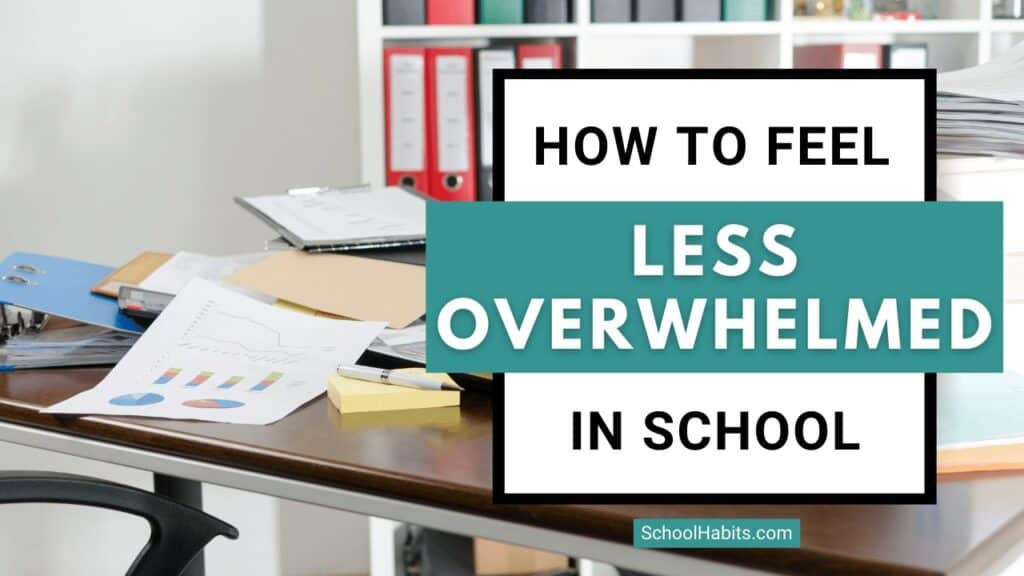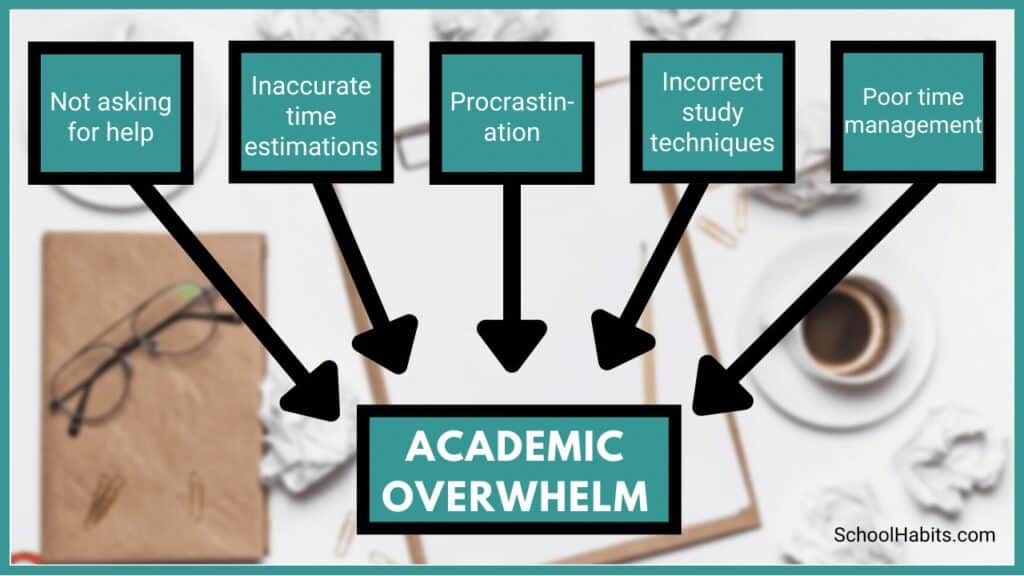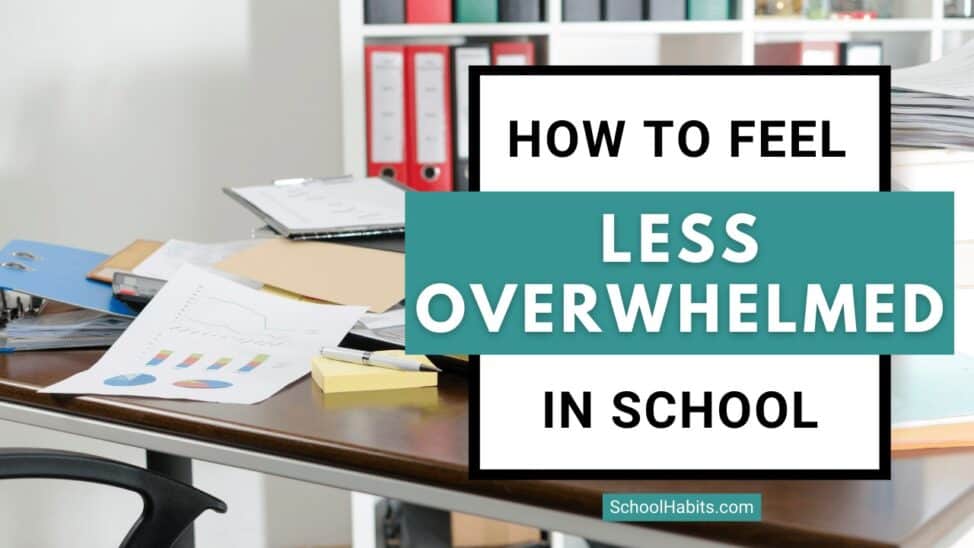By Katie Azevedo, M.Ed.

Feeling overwhelmed in school is a primary reason students experience anxiety, miss school, sleep poorly, and avoid assignments. That can hardly be surprising, as school is essentially a high-stakes, full-time job with endless assessments and many moving parts.
Common causes of feeling overwhelmed in school
What contributes to a student feeling overwhelmed in school depends on various factors, including student skill level, teacher aptitude, parental pressure, school resources, and student resources. Unfortunately, many of these causes are beyond a student’s control.
However, many causes of academic overwhelm are well within a student’s control, and that’s what this blog post aims to address. Sources of stress and anxiety that students have control over often include:
- Not asking for help
- Not accurately estimating how long tasks take to complete
- Procrastinating on assignments that are hard or unclear
- Not studying correctly
- Not managing time appropriately
How to feel less overwhelmed in school
While the very nature of education can be demanding, there are some strategies that can help students feel less overwhelmed in school. The key behind each of the strategies is taking responsibility and taking action. If you’re feeling overwhelmed in school, DO NOT DO NOTHING.
1. Don’t ignore the confusion
Pretending you’re not confused is the best way to stay confused. Seriously, I want you to internalize that. I know confusion is an icky feeling (what are we learning? What does that mean? How do I do this? WHO AM I?!), but when you feel confused in class, you need to see that as valuable feedback. Your confusion should tell you to slow down and ask questions; if you don’t slow down and ask questions, you will end up overwhelmed and more confused.
Here are some tips for when you feel confused in class:
- Read this post all about feeling confused in class.
- If you’re confused while taking notes at home, write a question mark in your notes and ask the teacher or a classmate to explain the material at the first opportunity.
- If you’re confused during a lecture class, raise your hand and ask the teacher to repeat themself or clarify the part you’re confused about. You can even ask the teacher to give more examples.
- If you’re confused while doing group work or independent work during class, ask your classmates for help or approach the teacher at their desk.
- If you’re confused about anything at any time, meet with your teacher.
2. Set up systems
Not knowing what’s happening and when it’s happening is a guaranteed route to feeling overwhelmed in school. If you’re in high school or college, you must have the two following systems in place:
- A homework-tracking system
- A time-tracking system
The above two systems are really non-negotiable. They also work together beautifully. If you’re looking for just one strategy for how to feel less overwhelmed in school, it would be this one.
A homework tracking system includes some kind of assignment notebook (digital or analog), but does NOT include your learning management system (LMS). Your LMS is where your teachers post assignments, usually Google Classroom, Schoology, Canvas, or something of that nature. Relying on your LMS to track homework is not sufficient, because you’re at the mercy of what your teachers load into the platform: there’s no way for you to add your own assignments, such as studying, reading, preparing for presentations, etc. Here’s what you need to know about homework tracking systems.
A time tracking system includes your calendar. Here is my complete tutorial on how to use Google Calendar for school. Again, not knowing what’s happening day to day is a direct route to stress and anxiety.
How to combine your homework and time tracking systems:
- Figure out how much available time you have in the day, using my Google Calendar tutorial (linked above)
- Have an accurate list of late, current and upcoming assignments, including tests, in your assignment notebook
- Like puzzle pieces, fit your assignments into the time pockets you identified as available for homework in step 1
- Don’t ignore the moments when the math doesn’t add up. If you have more work than can mathematically fit into your time pockets, you need to take a different action.
3. Start before you want to
I know procrastinating feels good in the moment because you’re avoiding the work. But procrastinating on assignments always, always leads to anxiety and overwhelm in the end. I dare you to think of a time when you procrastinated and weren’t more stressed out in the end.
- Know you’re having a test next week? Start studying now, using spaced repetition.
- Have an essay due in a few days? Create your doc and make your outline.
- Have 3 chapters to read in two days? Start now by reading one and a half chapters.
I know you don’t want to start. Really, I know that. But start regardless of how you feel about it.
Also, here are my topic-specific anti-procrastination guides:
- How to make a task less boring
- How to make a task less frustrating
- How to give a task more structure and clarity
- How to do a task when you just don’t care
- How to stop procrastinating: A complete overview guide
4. Study using active recall
Do you study a lot but still not do well on tests? Then you’re probably not using active recall to study. If you’re re-reading notes, skimming over your textbook, or looking over class slide decks, you’re not studying. Here’s how to use active recall to study. If you’re doing anything else, you’re wasting your time and will end up more overwhelmed.
Another helpful resource is my blog post that teaches you how to study less (for real – I promise).

5. Do fewer non-essential activities
Feeling overwhelmed in school (and in other contexts, too) usually comes from feeling like we have too much to do and not enough time. If you’ve got your procrastination under control (for real) and you’re managing your calendar well, and you’re still overwhelmed with the amount of work you have, you might have to do fewer things.
In this post, I talk about the true cost of doing activities. You should read it. Honestly, the reality is that sometimes we have to temporarily cut back on our commitments to get us through busy periods. I know that stinks, but there’s no alternative. (No, not doing your school work is not an alternative.)
If the commitments on your calendar are truly non-negotiable, then you have to get real about cutting back on other non-essentials, such as spending hours on your phone (yes, hours … check your screen time tracker … it’s hours), watching TV, and playing video games. Yes, I know these are fun activities, but you’re here looking for tips about how to feel less overwhelmed in school, and getting real about where you’re spending your time is a key tip.
Also, if you’re overwhelmed because of a particularly challenging class, here are my 10 tips for managing hard classes. If you’re feeling like you have too much to do and not enough time to do it all, and you need a quick fix (kinda), you definitely need to know what your only two real options are.
If you have a part-time job and you’re struggling to manage work and school, these 15 tips for balancing school and a part-time job are for you.
Final note about feeling overwhelmed in school
If you’ve sincerely done what you can to feel less overwhelmed, and you’re still experiencing significant feelings of anxiety or hopelessness, please seek help. Talk to your parents, a school counselor, your doctor or a therapist. Sometimes, despite our best independent efforts, we just need help from an outside source. You are worth it.
One more thing before you go! Did you know I have a podcast called Learn and Work Smarter? It’s for YOU! I’ve included an episode below that has some more strategies for when you’re overwhelmed. Give it a listen! (PS: It’s also available on Apple Podcasts, Spotify, Amazon Music, and all the places where you would listen to podcasts.)

04. What to Do When You're Overwhelmed: Practical Strategies You Can Use Now – Learn and Work Smarter
More resources about school stress
Here’s where I reveal the number one source sources of school stress for most students. Whether it’s stress about time, assignments, studying or grades, they all have one thing in common.

